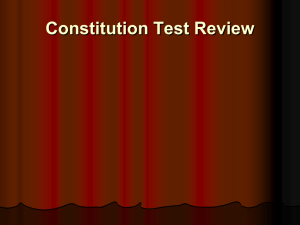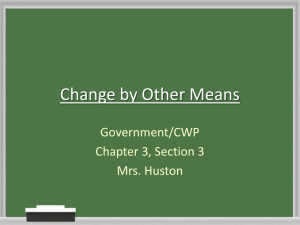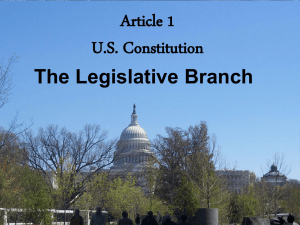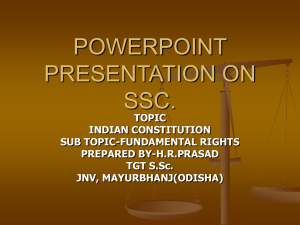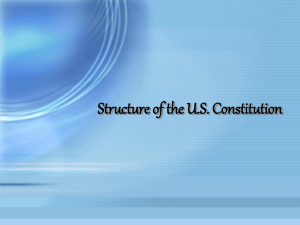Living Constitution 1 - Preamble _ Article 1
advertisement
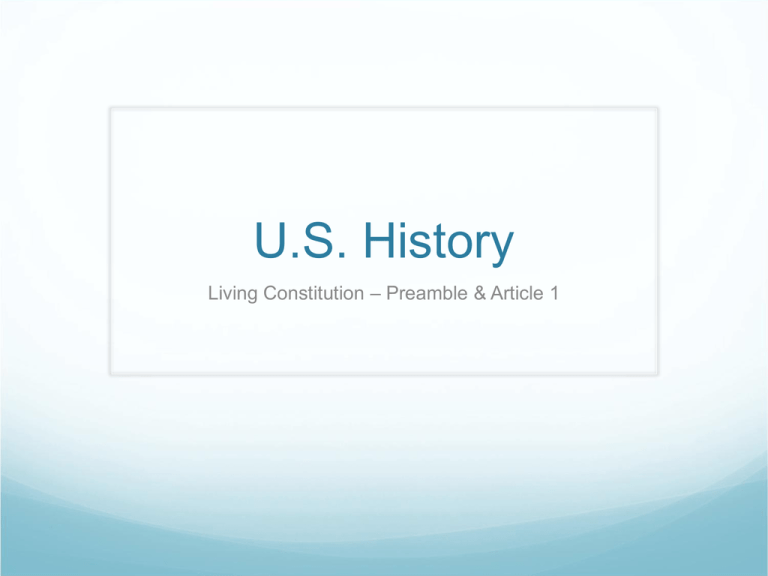
U.S. History Living Constitution – Preamble & Article 1 I’m Just A Bill http://www.youtube.com/watch?v=tyeJ55o3El0&feature=related Living Constitution – Preamble & Article 1 CA Standards: 11.1.3 Understand the history of the Constitution after 1787 with emphasis on federal vs state authority and growing democratization Objectives: • Explain the purpose for establishing the Constitution • Identify the powers of the Legislature Homework In Notebook – write definitions for: • • • • • • • Chief Executive Electoral College Succession State of the Union Address Supreme Court Judicial Power Judicial Review Definitions are found on page 27 in Reading Study Guide Workbook Read Pages 90 -93 The Americans: Reconstruction to the 21st Century Prepare for Open notebook Quiz Living Constitution – Preamble & Article 1 Main Idea The Articles of Confederation was an agreement among states. But the framers of the Constitution wanted to be sure its legitimacy came from the American people, not from the states, which might decide to withdraw their support at any time. Living Constitution – Preamble & Article 1 Why It Matters Now The Constitution, as a living document, is interpreted anew every American generation to meet the changing needs of our nation. Living Constitution – Preamble & Article 1 Terms & Names page 25 in Reading Study Guide Workbook Preamble Enumerated Powers Congress Implied Powers House of Representatives Senate Checks and Balances Elastic Clause Notes: Living Constitution The Preamble The Preamble establishes the purpose of the Constitution: - To form a more perfect Union - Establish justice - Insure domestic tranquility - Provide for the common defense - Promote the general welfare - Secure the blessings of liberty to ourselves and our posterity Notes: Living Constitution Article 1 – The Legislature Article 1 – creates Congress: - All legislative powers lies with a Congress of the United States - Congress shall consist of a Senate and House of Representatives Notes: Living Constitution House of Representatives - Members of the House of Representatives shall be elected every 2 years. - To be eligible to be elected into the House of Representatives one must be at least twenty-five years old, a citizen of the United states for at least seven years, and lives within the state he/she is elected. - The number of Representatives shall be apportioned according to the population of their states. - The House of Representatives shall chose their Speaker and other officers; and shall have the sole power of impeachment. Notes: Living Constitution The Senate - Members of the Senate shall be elected every 6 years. - To be eligible to be elected into the Senate one must be at least thirty years old, a citizen of the United states for at least nine years, and lives within the state he/she is elected. - Every state will have two senators. - The Vice-President of the United States shall be the President of the Senate, but shall have no vote, unless there is a tie. - The Senate shall have the sole power to try all impeachments. Notes: Living Constitution Interesting privileges - Senators and Representatives shall in all cases, except for treason, felony, and breach of peace, be privileged from arrest during their attendance at a session, including transportation to and from. - And for any speech or debate . Notes: Living Constitution How a Bill Becomes A Law - A bill is introduced in the House or Senate and referred to a standing committee. - A bill can be reported out of a committee with or without changes or shelved. - Either house of Congress debates the bill and may make revisions. If passed, the bill is sent to the other house. A majority of members must be present to pass a bill. - If the House and the Senate pass different versions of the bill, both versions go to a conference committee to workout the differences Notes: Living Constitution How a Bill Becomes A Law - The conference committee submits a single version of the bill to the House and the Senate - If both houses accept the compromise version, the bill is sent to the president to be signed - If the President signs the bill, it becomes law. - If the President vetoes the bill, the House and the Senate may override the veto by a vote of two-thirds of the members present in each house, and then it becomes law. Notes: Living Constitution Short list of other powers granted to Congress - Congress shall have to power to lay and collect taxes. - Borrow money on the credit of the United States. - To regulate commerce with foreign nations and between states. - To print money - To declare war - To raise, maintain and regulate the armed forces - To make all laws necessary to carry out its duties (Elastic Clause) Notes: Living Constitution Powers denied the states - No state: - shall enter into a treaty or alliance - print its own money - declare war unless invaded or in such imminent danger that it can not delay action. Notes: Living Constitution Guided Reading The Preamble and Article 1 Read Pages 25 & 26 Reading Study Guide Notes: Living Constitution Guided Reading 1. What are the two purposes of the Preamble? -To show the legitimacy of the new government or its rights to rule. - To show why the new government is being formed. Notes: Living Constitution Guided Reading 2. What are two important differences between the House and the Senate? -Representatives serve 2yrs. Senators serve 6 yrs. - The number of representatives sent by states to the House of Representatives is based on the population of the individual states. Each state has two senators. Notes: Living Constitution Guided Reading 3. Why does Congress limit the power of the president and military? Civilian control of the military is to prevent the armed forces from staging a coup or seizing control of the government. Be prepared for open notebook exam


